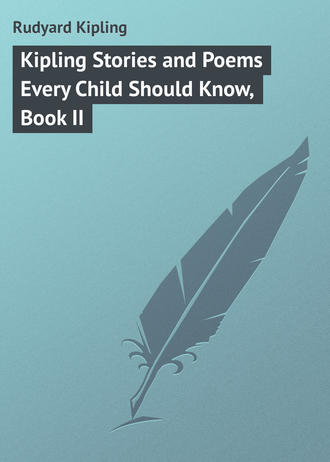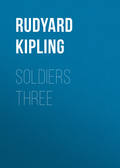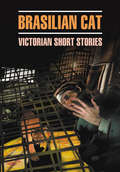
Редьярд Джозеф Киплинг
Kipling Stories and Poems Every Child Should Know, Book II
The weeks were interminable and Papa and Mamma were clean forgotten. Harry had left school and was a clerk in a Banking-Office. Freed from his presence, Black Sheep resolved that he should no longer be deprived of his allowance of pleasure-reading. Consequently, when he failed at school he reported that all was well, and conceived a large contempt for Aunty Rosa as he saw how easy it was to deceive her. "She says I'm a little liar when I don't tell lies, and now I do, she does n't know," thought Black Sheep. Aunty Rosa had credited him in the past with petty cunning and stratagem that had never entered into his head. By the light of the sordid knowledge that she had revealed to him he paid her back full tale. In a household where the most innocent of his motives, his natural yearning for a little affection, had been interpreted into a desire for more bread and jam or to ingratiate himself with strangers and so put Harry into the background, his work was easy. Aunty Rosa could penetrate certain kinds of hypocrisy, but not all. He set his child's wits against hers and was no more beaten. It grew monthly more and more of a trouble to read the schoolbooks, and even the pages of the open-print story-books danced and were dim. So Black Sheep brooded in the shadows that fell about him and cut him off from the world, inventing horrible punishments for "dear Harry," or plotting another line of the tangled web of deception that he wrapped round Aunty Rosa.
Then the crash came and the cobwebs were broken. It was impossible to foresee everything. Aunty Rosa made personal inquiries as to Black Sheep's progress and received information that startled her. Step by step, with a delight as keen as when she convicted an underfed housemaid of the theft of cold meats, she followed the trail of Black Sheep's delinquencies. For weeks and weeks, in order to escape banishment from the book-shelves, he had made a fool of Aunty Rosa, of Harry, of God, of all the world. Horrible, most horrible, and evidence of an utterly depraved mind.
Black Sheep counted the cost. "It will only be one big beating, and then she'll put a card with 'Liar' on my back, same as she did before. Harry will whack me and pray for me, and she will pray for me at prayers and tell me I'm a Child of the Devil and give me hymns to learn. But I've done all my reading and she never knew. She'll say she knew all along. She's an old liar, too," said he.
For three days Black Sheep was shut in his own bedroom – to prepare his heart. "That means two beatings. One at school and one here. That one will hurt most." And it fell even as he thought. He was thrashed at school before the Jews and the hubshi, for the heinous crime of bringing home false reports of progress. He was thrashed at home by Aunty Rosa on the same count, and then the placard was produced. Aunty Rosa stitched it between his shoulders and bade him go for a walk with it upon him.
"If you make me do that," said Black Sheep very quietly, "I shall burn this house down, and perhaps I'll kill you. I don't know whether I can kill you – you 're so bony – but I'll try."
No punishment followed this blasphemy, though Black Sheep held himself ready to work his way to Aunty Rosa's withered throat, and grip there till he was beaten off. Perhaps Aunty Rosa was afraid, for Black Sheep, having reached the Nadir of Sin, bore himself with a new recklessness.
In the midst of all the trouble there came a visitor from over the seas to Downe Lodge, who knew Papa and Mamma, and was commissioned to see Punch and Judy. Black Sheep was sent to the drawing-room and charged into a solid tea-table laden with china.
"Gently, gently, little man," said the visitor turning Black Sheep's face to the light slowly. "What's that big bird on the palings?"
"What bird?" asked Black Sheep.
The visitor looked deep down into Black Sheep's eyes for a half a minute, and then said suddenly: "Good God, the little chap's nearly blind."
It was a most business-like visitor. He gave orders, on his own responsibility, that Black Sheep was not to go to school or open a book until Mamma came home. "She'll be here in three weeks, as you know of course," said he, "and I'm Inverarity Sahib. I ushered you into this wicked world, young man, and a nice use you seem to have made of your time. You must do nothing whatever. Can you do that?"
"Yes," said Punch in a dazed way. He had known that Mamma was coming. There was a chance, then, of another beating. Thank Heaven, Papa was n't coming too. Aunty Rosa had said of late that he ought to be beaten by a man.
For the next three weeks Black Sheep was strictly allowed to do nothing. He spent his time in the old nursery looking at the broken toys, for all of which account must be rendered to Mamma. Aunty Rosa hit him over the hands if even a wooden boat were broken. But that sin was of small importance compared to the other revelations, so darkly hinted at by Aunty Rosa. "When your mother comes, and hears what I have to tell her, she may appreciate you properly," she said grimly, and mounted guard over Judy lest that small maiden should attempt to comfort her brother, to the peril of her own soul.
And Mamma came – in a four-wheeler and a flutter of tender excitement. Such a Mamma! She was young, frivolously young, and beautiful, with delicately flushed cheeks, eyes that shone like stars, and a voice that needed no additional appeal of outstretched arms to draw little ones to her heart. Judy ran straight to her, but Black Sheep hesitated. Could this wonder be "showing off"? She would not put out her arms when she knew of his crimes. Meantime was it possible that by fondling she wanted to get anything out of Black Sheep? Only all his love and all his confidence; but that Black Sheep did not know. Aunty Rosa withdrew and left Mamma, kneeling between her children, half laughing, half crying, in the very hall where Punch and Judy had wept five years before.
"Well, chicks, do you remember me?"
"No," said Judy frankly, "but I said 'God bless Papa and Mamma,' ev'vy night."
"A little," said Black Sheep. "Remember I wrote to you every week, anyhow. That is n't to show off, but 'cause of what comes afterward."
"What comes after! What should come after, my darling boy?" And she drew him to her again. He came awkwardly, with many angles. "Not used to petting," said the quick Mother-soul. "The girl is."
"She's too little to hurt anyone," thought Black Sheep, "and if I said I'd kill her, she'd be afraid. I wonder what Aunty Rosa will tell."
There was a constrained late dinner, at the end of which Mamma picked up Judy and put her to bed with endearments manifold. Faithless little Judy had shown her defection from Aunty Rosa already. And that lady resented it bitterly. Black Sheep rose to leave the room.
"Come and say good night," said Aunty Rosa, offering a withered cheek.
"Huh!" said Black Sheep. "I never kiss you, and I'm not going to show off. Tell that woman what I've done, and see what she says."
Black Sheep climbed into bed feeling that he had lost Heaven after a glimpse through the gates. In half an hour "that woman" was bending over him. Black Sheep flung up his right arm. It was n't fair to come and hit him in the dark. Even Aunty Rosa never tried that. But no blow followed.
"Are you showing off? I won't tell you anything more than Aunty Rosa has, and she does n't know everything," said Black Sheep as clearly as he could for the arms round his neck.
"Oh, my son – my little, little son! It was my fault – my fault, darling – and yet how could we help it? Forgive me, Punch." The voice died out in a broken whisper, and two hot tears fell on Black Sheep's forehead.
"Has she been making you cry, too?" he asked. "You should see Jane cry. But you're nice, and Jane is a Born Liar – Aunty Rosa says so."
"Hush, Punch, hush! My boy, don't talk like that. Try to love me a little bit – a little bit. You don't know how I want it. Punch-baba, come back to me! I am your Mother – your own Mother – and never mind the rest. I know – yes, I know, dear. It does n't matter now. Punch, won't you care for me a little?"
It is astonishing how much petting a big boy of ten can endure when he is quite sure that there is no one to laugh at him. Black Sheep had never been made much of before, and here was this beautiful woman treating him – Black Sheep, the Child of the Devil and the Inheritor of Undying Flame – as though he were a small God.
"I care for you a great deal, Mother dear," he whispered at last, "and I'm glad you've come back; but are you sure Aunty Rosa told you everything?"
"Everything. What does it matter? But – " the voice broke with a sob that was also laughter – "Punch, my poor, dear, half-blind darling, don't you think it was a little foolish of you?"
"No. It saved a lickin'."
Mamma shuddered and slipped away in the darkness to write a long letter to Papa. Here is an extract:
"… Judy is a dear, plump little prig who adores the woman, and wears with as much gravity as her religious opinions – only eight, Jack! – a venerable horsehair atrocity which she calls her Bustle. I have just burned it, and the child is asleep in my bed as I write. She will come to me at once. Punch I cannot quite understand. He is well nourished, but seems to have been worried into a system of small deceptions which the woman magnifies into deadly sins. Don't you recollect our own up-bringing, dear, when the Fear of the Lord was so often the beginning of falsehood? I shall win Punch to me before long. I am taking the children away into the country to get them to know me, and, on the whole, I am content, or shall be when you come home, dear boy, and then, thank God, we shall be all under one roof again at last!"
Three months later, Punch, no longer Black Sheep, has discovered that he is the veritable owner of a real, live, lovely Mamma, who is also a sister, comforter, and friend, and that he must protect her till the Father comes home. Deception does not suit the part of a protector, and, when one can do anything without question, where is the use of deception?
"Mother would be awfully cross if you walked through that ditch," says Judy, continuing a conversation.
"Mother's never angry," says Punch. "She'd just say, 'You're a little pagal'; and that's not nice, but I'll show."
Punch walks through the ditch and mires himself to the knees. "Mother, dear," he shouts, "I'm just as dirty as I can pos-sib-ly be!"
"Then change your clothes as quickly as you pos-sib-ly can!" rings out Mother's clear voice from the house. "And don't be a little pagal!"
"There! Told you so," says Punch. "It's all different now, and we are just as much Mother's as if she had never gone."
Not altogether, O Punch, for when young lips have drunk deep of the bitter waters of Hate, Suspicion, and Despair, all the Love in the world will not wholly take away that knowledge; though it may turn darkened eyes for a while to the light, and teach Faith where no Faith was.
V
WEE WILLIE WINKIE
"An officer and a gentleman."
His full name was Percival William Williams, but he picked up the other name in a nursery-book, and that was the end of the christened titles. His mother's ayah called him Willie-Baba, but as he never paid the faintest attention to anything that the ayah said, her wisdom did not help matters.
His father was the Colonel of the 195th, and as soon as Wee Willie Winkie was old enough to understand what Military Discipline meant, Colonel Williams put him under it. There was no other way of managing the child. When he was good for a week, he drew good-conduct pay; and when he was bad, he was deprived of his good-conduct-stripe. Generally he was bad, for India offers so many chances to little six-year-olds of going wrong.
Children resent familiarity from strangers, and Wee Willie Winkie was a very particular child. Once he accepted an acquaintance, he was graciously pleased to thaw. He accepted Brandis, a subaltern of the 195th, on sight. Brandis was having tea at the Colonel's, and Wee Willie Winkie entered, strong in the possession of a good-conduct badge won for not chasing the hens round the compound. He regarded Brandis with gravity for at least ten minutes, and then delivered himself of his opinion.
"I like you," said he slowly, getting off his chair and coming over to Brandis. "I like you. I shall call you Coppy, because of your hair. Do you mind being called Coppy? It is because of ve hair, you know."
Here was one of the most embarrassing of Wee Willie Winkie's peculiarities. He would look at a stranger for some time, and then, without warning or explanation, would give him a name. And the name stuck. No regimental penalties could break Wee Willie Winkie of this habit. He lost his good-conduct badge for christening the Commissioner's wife "Pobs"; but nothing that the Colonel could do made the Station forego the nickname, and Mrs. Collen remained Mrs. "Pobs" till the end of her stay. So Brandis was christened "Coppy," and rose, therefore, in the estimation of the regiment.
If Wee Willie Winkie took an interest in anyone, the fortunate man was envied alike by the mess and the rank and file. And in their envy lay no suspicion of self-interest. "The Colonel's son" was idolized on his own merits entirely. Yet Wee Willie Winkie was not lovely. His face was permanently freckled, as his legs were permanently scratched, and in spite of his mother's almost tearful remonstrances he had insisted upon having his long yellow locks cut short in the military fashion. "I want my hair like Sergeant Tummil's," said Wee Willie Winkie, and, his father abetting, the sacrifice was accomplished.
Three weeks after the bestowal of his youthful affections on Lieutenant Brandis – henceforward to be called "Coppy" for the sake of brevity – Wee Willie Winkie was destined to behold strange things and far beyond his comprehension.
Coppy returned his liking with interest. Coppy had let him wear for five rapturous minutes his own big sword – just as tall as Wee Willie Winkie. Coppy had promised him a terrier puppy; and Coppy had permitted him to witness the miraculous operation of shaving. Nay, more – Coppy had said that even he, Wee Willie Winkie, would rise in time to the ownership of a box of shiny knives, a silver soap-box and a silver-handled "sputter-brush," as Wee Willie Winkie called it. Decidedly, there was no one, except his father, who could give or take away good-conduct badges at pleasure, half so wise, strong, and valiant as Coppy with the Afghan and Egyptian medals on his breast. Why, then, should Coppy be guilty of the unmanly weakness of kissing – vehemently kissing – a "big girl," Miss Allardyce to wit? In the course of a morning ride, Wee Willie Winkie had seen Coppy so doing, and, like the gentleman he was, had promptly wheeled round and cantered back to his groom, lest the groom should also see.
Under ordinary circumstances he would have spoken to his father, but he felt instinctively that this was a matter on which Coppy ought first to be consulted.
"Coppy," shouted Wee Willie Winkie, reining up outside that subaltern's bungalow early one morning – "I want to see you, Coppy!"
"Come in, young 'un," returned Coppy, who was at early breakfast in the midst of his dogs. "What mischief have you been getting into now?"
Wee Willie Winkie had done nothing notoriously bad for three days, and so stood on a pinnacle of virtue.
"I've been doing nothing bad," said he, curling himself into a long chair with a studious affectation of the Colonel's langour after a hot parade. He buried his freckled nose in a tea-cup and, with eyes staring roundly over the rim, asked: "I say, Coppy, is it pwoper to kiss big girls?"
"By Jove! You're beginning early. Who do you want to kiss?"
"No one. My muvver's always kissing me if I don't stop her. If it is n't pwoper, how was you kissing Major Allardyce's big girl last morning, by ve canal?"
Coppy's brow wrinkled. He and Miss Allardyce had with great craft managed to keep their engagement secret for a fortnight. There were urgent and imperative reasons why Major Allardyce should not know how matters stood for at least another month, and this small marplot had discovered a great deal too much.
"I saw you," said Wee Willie Winkle calmly. "But ve groom did n't see. I said, 'Hut jao.'"
"Oh, you had that much sense, you young Rip," groaned poor Coppy, half amused and half angry. "And how many people may you have told about it?"
"Only me myself. You did n't tell when I twied to wide ve buffalo ven my pony was lame; and I fought you would n't like."
"Winkie," said Coppy enthusiastically, shaking the small hand, "you're the best of good fellows. Look here, you can't understand all these things. One of these days – hang it, how can I make you see it! – I'm going to marry Miss Allardyce, and then she'll be Mrs. Coppy, as you say. If your young mind is so scandalized at the idea of kissing big girls, go and tell your father."
"What will happen?" said Wee Willie Winkie, who firmly believed that his father was omnipotent.
"I shall get into trouble," said Coppy, playing his trump card with an appealing look at the holder of the ace.
"Ven I won't," said Wee Willie Winkie briefly. "But my faver says it's un-man-ly to be always kissing, and I did n't fink you'd do vat, Coppy."
"I'm not always kissing, old chap. It's only now and then, and when you're bigger you'll do it too. Your father meant it's not good for little boys."
"Ah!" said Wee Willie Winkle, now fully enlightened. "It's like ve sputter-brush?"
"Exactly," said Coppy gravely.
"But I don't fink I'll ever want to kiss big girls, nor no one, 'cept my muvver. And I must vat, you know."
There was a long pause, broken by Wee Willie Winkie.
"Are you fond of vis big girl, Coppy?"
"Awfully!" said Coppy.
"Fonder van you are of Bell or ve Butcha – or me?"
"It's in a different way," said Coppy. "You see, one of these days Miss Allardyce will belong to me, but you'll grow up and command the Regiment and – all sorts of things. It's quite different, you see."
"Very well," said Wee Willie Winkie, rising. "If you're fond of ve big girl, I won't tell anyone. I must go now."
Coppy rose and escorted his small guest to the door, adding: "You're the best of little fellows, Winkie. I tell you what. In thirty days from now you can tell if you like – tell anyone you like."
Thus the secret of the Brandis-Allardyce engagement was dependent on a little child's word. Coppy, who knew Wee Willie Winkie's idea of truth, was at ease, for he felt that he would not break promises. Wee Willie Winkie betrayed a special and unusual interest in Miss Allardyce, and, slowly revolving round that embarrassed young lady, was used to regard her gravely with unwinking eye. He was trying to discover why Coppy should have kissed her. She was not half so nice as his own mother. On the other hand she was Coppy's property, and would in time belong to him. Therefore it behooved him to treat her with as much respect as Coppy's big sword or shiny pistol.
The idea that he shared a great secret in common with Coppy kept Wee Willie Winkie unusually virtuous for three weeks. Then the Old Adam broke out, and he made what he called a "camp-fire" at the bottom of the garden. How could he have foreseen that the flying sparks would have lighted the Colonel's little hay-rick and consumed a week's store for the horses? Sudden and swift was the punishment – deprivation of the good-conduct badge and, most sorrowful of all, two days' confinement to barracks – the house and veranda – coupled with the withdrawal of the light of his father's countenance.
He took the sentence like the man he strove to be, drew himself up with a quivering under-lip, saluted, and, once clear of the room, ran to weep bitterly in his nursery – called by him "my quarters." Coppy came in the afternoon and attempted to console the culprit.
"I'm under awwest," said Wee Willie Winkie mournfully, "and I did n't ought to speak to you."
Very early the next morning he climbed on to the roof of the house – that was not forbidden – and beheld Miss Allardyce going for a ride.
"Where are you going?" cried Wee Willie Winkie.
"Across the river," she answered, and trotted forward.
Now the cantonment in which the 195th lay was bounded on the north by a river – dry in the winter. From his earliest years, Wee Willie Winkie had been forbidden to go across the river, and had noted that even Coppy – the almost almighty Coppy – had never set foot beyond it. Wee Willie Winkie had once been read to, out of a big blue book, the history of the Princess and the Goblins – a most wonderful tale of a land where the Goblins were always warring with the children of men until they were defeated by one Curdie. Ever since that date it seemed to him that the bare black and purple hills across the river were inhabited by Goblins, and, in truth, everyone had said that there lived the Bad Men. Even in his own house the lower halves of the windows were covered with green paper on account of the Bad Men who might, if allowed clear view, fire into peaceful drawing-rooms and comfortable bedrooms. Certainly, beyond the river, which was the end of all the Earth, lived the Bad Men. And here was Major Allardyce's big girl, Coppy's property, preparing to venture into their borders! What would Coppy say if anything happened to her? If the Goblins ran off with her as they did with Curdie's Princess? She must at all hazards be turned back.
The house was still. Wee Willie Winkie reflected for a moment on the very terrible wrath of his father; and then – broke his arrest! It was a crime unspeakable. The low sun threw his shadow, very large and very black, on the trim garden-paths, as he went down to the stables and ordered his pony. It seemed to him in the hush of the dawn that all the big world had been bidden to stand still and look at Wee Willie Winkie guilty of mutiny. The drowsy groom handed him his mount, and since the one great sin made all others insignificant, Wee Willie Winkie said that he was going to ride over to Coppy Sahib, and went out at a foot-pace, stepping on the soft mould of the flower-borders.
The devastating track of the pony's feet was the last misdeed that cut him off from all sympathy of Humanity. He turned into the road, leaned forward, and rode as fast as the pony could put foot to the ground in the direction of the river.
But the liveliest of twelve-two ponies can do little against the long canter of a Waler. Miss Allardyce was far ahead, had passed through the crops, beyond the Police-post, when all the guards were asleep, and her mount was scattering the pebbles of the river bed as Wee Willie Winkie left the cantonment and British India behind him. Bowed, forward and still flogging, Wee Willie Winkie shot into Afghan territory, and could just see Miss Allardyce a black speck, flickering across the stony plain. The reason of her wandering was simple enough. Coppy, in a tone of too-hastily-assumed authority, had told her over night that she must not ride out by the river. And she had gone to prove her own spirit and teach Coppy a lesson.
Almost at the foot of the inhospitable hills Wee Willie Winkie saw the Waler blunder and come down heavily. Miss Allardyce struggled clear, but her ankle had been severely twisted, and she could not stand. Having thus demonstrated her spirit, she wept copiously, and was surprised by the apparition of a white, wide-eyed child in khaki, on a nearly spent pony.
"Are you badly, badly hurted?" shouted Wee Willie Winkie, as soon as he was within range. "You did n't ought to be here."
"I don't know," said Miss Allardyce ruefully ignoring the reproof. "Good gracious, child, what are you doing here?"
"You said you was going acwoss ve wiver," panted Wee Willie Winkie, throwing himself off his pony. "And nobody – not even Coppy – must go acwoss ve wiver, and I came after you ever so hard, but you would n't stop, and now you 've hurted yourself, and Coppy will be angry wiv me, and – I've bwoken my awwest! I've bwoken my awwest!"
The future Colonel of the 195th sat down and sobbed. In spite of the pain in her ankle the girl was moved.
"Have you ridden all the way from cantonments, little man? What for?"
"You belonged to Coppy. Coppy told me so!" wailed Wee Willie Winkie disconsolately. "I saw him kissing you, and he said he was fonder of you van Bell or ve Butcha or me. And so I came. You must get up and come back. You did n't ought to be here. Vis is a bad place, and I 've bwoken my awwest."
"I can't move, Winkie," said Miss Allardyce, with a groan. "I've hurt my foot. What shall I do?"
She showed a readiness to weep afresh which steadied Wee Willie Winkie, who had been brought up to believe that tears were the depth of unmanliness. Still, when one is as great a sinner as Wee Willie Winkie, even a man may be permitted to break down.
"Winkie," said Miss Allardyce, "when you've rested a little, ride back and tell them to send out something to carry me back in. It hurts fearfully."
The child sat still for a little time and Miss Allardyce closed her eyes; the pain was nearly making her faint. She was roused by Wee Willie Winkie tying up the reins on his pony's neck and setting it free with a vicious cut of his whip that made it whicker. The little animal headed toward the cantonments.
"Oh, Winkie! What are you doing?"
"Hush!" said Wee Willie Winkie. "Vere's a man coming – one of ve Bad Men. I must stay wiv you. My faver says a man must always look after a girl. Jack will go home, and ven vey 'll come and look for us. Vat 's why I let him go."
Not one man, but two or three, had appeared from behind the rocks of the hills, and the heart of Wee Willie Winkie sank within him, for just in this manner were the Goblins wont to steal out and vex Curdie's soul. Thus had they played in Curdie's garden, he had seen the picture, and thus had they frightened the Princess's nurse. He heard them talking to each other, and recognized with joy the bastard Pushto that he had picked up from one of his father's grooms lately dismissed. People who spoke that tongue could not be the Bad Men. They were only natives, after all.
They came up to the boulders on which Miss Allardyce's horse had blundered.
Then rose from the rock Wee Willie Winkie, child of the Dominant Race, aged six and three-quarters, and said briefly and emphatically "Jao!" The pony had crossed the river-bed.
The men laughed, and laughter from natives was the one thing Wee Willie Winkie could not tolerate. He asked them what they wanted and why they did not depart. Other men with most evil faces and crooked-stocked guns crept out of the shadows of the hills, till, soon, Wee Willie Winkie was face to face with an audience some twenty strong. Miss Allardyce screamed.
"Who are you?" said one of the men.
"I am the Colonel Sahib's son, and my order is that you go at once. You black men are frightening the Miss Sahib. One of you must run into cantonments and take the news that the Miss Sahib has hurt herself, and that the Colonel's son is here with her."
"Put our feet into the trap?" was the laughing reply. "Hear this boy's speech!"
"Say that I sent you – I, the Colonel's son. They will give you money."
"What is the use of this talk? Take up the child and the girl, and we can at least ask for the ransom. Ours are the villages on the heights," said a voice in the background.
These were the Bad Men – worse than Goblins – and it needed all Wee Willie Winkie's training to prevent him from bursting into tears. But he felt that to cry before a native, excepting only his mother's ayah, would be an infamy greater than any mutiny. Moreover, he, as future Colonel of the 195th, had that grim regiment at his back.
"Are you going to carry us away?" said Wee Willie Winkie, very blanched and uncomfortable.
"Yes, my little Sahib Bahadur," said the tallest of the men, "and eat you afterward."
"That is child's talk," said Wee Willie Winkie. "Men do not eat men."
A yell of laughter interrupted him, but he went on firmly – "And if you do carry us away, I tell you that all my regiment will come up in a day and kill you all without leaving one. Who will take my message to the Colonel Sahib?"
Speech in any vernacular – and Wee Willie Winkie had a colloquial acquaintance with three – was easy to the boy who could not yet manage his "r's" and "th's" aright.
Another man joined the conference, crying: "Oh, foolish men! What this babe says is true. He is the heart's heart of those white troops. For the sake of peace let them go both, for if he be taken, the regiment will break loose and gut the valley. Our villages are in the valley, and we shall not escape. That regiment are devils. They broke Khoda Yar's breast-bone with kicks when he tried to take the rifles; and if we touch this child they will fire and rape and plunder for a month, till nothing remains. Better to send a man back to take the message and get a reward. I say that this child is their God, and that they will spare none of us, nor our women, if we harm him."
It was Din Mahommed, the dismissed groom of the Colonel, who made the diversion, and an angry and heated discussion followed. Wee Willie Winkie, standing over Miss Allardyce, waited the upshot. Surely his "wegiment," his own "wegiment," would not desert him if they knew of his extremity.
The riderless pony brought the news to the 195th, though there had been consternation in the Colonel's household for an hour before. The little beast came in through the parade-ground in front of the main barracks, where the men were settling down to play Spoil-five till the afternoon. Devlin, the Colour Sergeant of E Company, glanced at the empty saddle and tumbled through the barrack-rooms, kicking up each Room Corporal as he passed. "Up, ye beggars! There's something happened to the Colonel's son," he shouted.
"He could n't fall off! S'elp me, 'e could n't fall off," blubbered a drummer-boy. "Go an' hunt acrost the river. He's over there if he's anywhere, an' maybe those Pathans have got 'im. For the love o' Gawd don't look for 'im in the nullahs! Let's go over the river."







